The Long Tail Book Review: Why The Future Of Business Is Selling Less Of More
by Chris Anderson
Published by Random House (UK), Hyperion Books (USA),
Retail price – UK £17.99, USA $24.95
Buy the book from Amazon US or Amazon UK
Buy the audio book from Amazon US
Summary
 The Long Tail is an important manual for the new economics of the Internet and digital culture. As well as demystifying the numbers it provides an essential guide to how to navigate a world where everything is available, all the time. Score: 95%
The Long Tail is an important manual for the new economics of the Internet and digital culture. As well as demystifying the numbers it provides an essential guide to how to navigate a world where everything is available, all the time. Score: 95%
Review
Every once in a while a book comes along that completely captures and defines a particular period. Nicholas Negroponte’s Being Digital defined the blossoming digital culture of the mid 90’s, now The Long Tail shows how the Internet will radically change our habits and behaviour.
Chris Anderson illustrates how our buying habits have been shaped by the economics of big business, creating the blockbuster culture; the selling of a narrow range of products to the biggest possible group of consumers. Anderson shows how the Internet, through companies such as eBay, Google and Amazon, radically changes that, allowing us to be more exploratory and specific about what we buy.
“The theory of the Long Tail is that our culture and economy is increasingly shifting away from a focus on a relatively small number of “hits” (mainstream products and markets) at the head of the demand curve and toward a huge number of niches in the tail. As the costs of production and distribution fall, especially online, there is now less need to lump products and consumers into one-size-fits-all containers. In an era without the constraints of physical shelf space and other bottlenecks of distribution, narrowly-target goods and services can be as economically attractive as mainstream fare.”
Anderson provides and eloquent and detailed analysis of various aspects of Internet culture and business and illustrates how the explosion of niche markets and filtering tools will allow us to zero-in on things that interest us, potentially shattering the hold that large manufacturers and retailers have exercised since the mid 20th century.
 The Long Tail effect is not limited to buying and selling, the process by which the book was written is a case in point. Anderson (editor in chief of Wired magazine) published the original Long Tail article in Wired back in October 04. The article rapidly became a hit and mushroomed into the Long Tail blog which Anderson used to publicly research and test his theories. Shortly before the publication date earlier this month, Anderson released copies of the book to bloggers across the globe for review. The process is a perfect example of a product being tested and developed publicly, thereby generating enough word of mouth interest to create a ready market for it. The strategy was proved a resounding success by the book’s appearance in Amazon’s top ten non-fiction list on its publication day.
The Long Tail effect is not limited to buying and selling, the process by which the book was written is a case in point. Anderson (editor in chief of Wired magazine) published the original Long Tail article in Wired back in October 04. The article rapidly became a hit and mushroomed into the Long Tail blog which Anderson used to publicly research and test his theories. Shortly before the publication date earlier this month, Anderson released copies of the book to bloggers across the globe for review. The process is a perfect example of a product being tested and developed publicly, thereby generating enough word of mouth interest to create a ready market for it. The strategy was proved a resounding success by the book’s appearance in Amazon’s top ten non-fiction list on its publication day.
Although The Long Tail is a business book, it is also about culture in general and how it’s changing. Freed from the constraints of the blockbuster culture, the consumer is able to delve into niches he never knew existed and also to contribute in a way that was not previously possible. The success of social software services such as Flickr and YouTube has allowed the audience to create and share their own material generating a genuinely new, interactive media which is actually competing in some respects with mainstream broadcast media.
 Some have taken this to mean that Anderson is sounding the death knell for blockbusters, something which he was at pains to counter on his blog, “Hits Aren’t Dead” he said, “I never said they were. What is dead is the monopoly of the hit. For too long hits or products intended to be hits have had the stage to themselves, because only hit-centric companies had access to the retail channel and the retail channel only had room for best-sellers. But now blockbusters must share the stage with a million niche products, and this will lead to a very different marketplace.”
Some have taken this to mean that Anderson is sounding the death knell for blockbusters, something which he was at pains to counter on his blog, “Hits Aren’t Dead” he said, “I never said they were. What is dead is the monopoly of the hit. For too long hits or products intended to be hits have had the stage to themselves, because only hit-centric companies had access to the retail channel and the retail channel only had room for best-sellers. But now blockbusters must share the stage with a million niche products, and this will lead to a very different marketplace.”
While not all the ideas in The Long Tail are Anderson’s own, like any good journalist, he manages to articulate the complexities of a difficult subject in a lucid and entertaining style.
Summary
The Long Tail is an important manual for the new economics of the Internet and digital culture. As well as demystifying the numbers it provides an essential guide to how to navigate a world where everything is available, all the time.
Score: 95%
Published by Random House (UK), Hyperion Books (USA),
Retail price – UK £17.99, USA $24.95
Buy the book from Amazon US or Amazon UK
Buy the audio book from Amazon US
 Sharman Networks, the company that distributed the file-sharing software, Kazaa, has finally come to an agreement with the media companies that have been chasing them for years throughout courts around the globe.
Sharman Networks, the company that distributed the file-sharing software, Kazaa, has finally come to an agreement with the media companies that have been chasing them for years throughout courts around the globe. It’s understood that the settlement doesn’t require the media companies to provide their content to Kazaa, but equally it doesn’t forbid Kazza carrying copyrighted material, if done ‘legitimately.’
It’s understood that the settlement doesn’t require the media companies to provide their content to Kazaa, but equally it doesn’t forbid Kazza carrying copyrighted material, if done ‘legitimately.’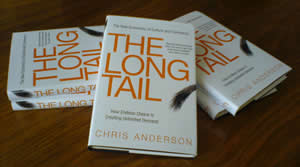 We’ve just published a
We’ve just published a  The Long Tail is an important manual for the new economics of the Internet and digital culture. As well as demystifying the numbers it provides an essential guide to how to navigate a world where everything is available, all the time. Score: 95%
The Long Tail is an important manual for the new economics of the Internet and digital culture. As well as demystifying the numbers it provides an essential guide to how to navigate a world where everything is available, all the time. Score: 95% The Long Tail effect is not limited to buying and selling, the process by which the book was written is a case in point. Anderson (editor in chief of Wired magazine) published the
The Long Tail effect is not limited to buying and selling, the process by which the book was written is a case in point. Anderson (editor in chief of Wired magazine) published the 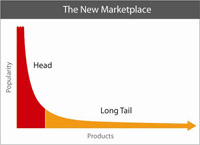 Some have taken this to mean that Anderson is sounding the death knell for blockbusters, something which he was at pains to counter on his blog, “Hits Aren’t Dead” he said, “I never said they were. What is dead is the monopoly of the hit. For too long hits or products intended to be hits have had the stage to themselves, because only hit-centric companies had access to the retail channel and the retail channel only had room for best-sellers. But now blockbusters must share the stage with a million niche products, and this will lead to a very different marketplace.”
Some have taken this to mean that Anderson is sounding the death knell for blockbusters, something which he was at pains to counter on his blog, “Hits Aren’t Dead” he said, “I never said they were. What is dead is the monopoly of the hit. For too long hits or products intended to be hits have had the stage to themselves, because only hit-centric companies had access to the retail channel and the retail channel only had room for best-sellers. But now blockbusters must share the stage with a million niche products, and this will lead to a very different marketplace.”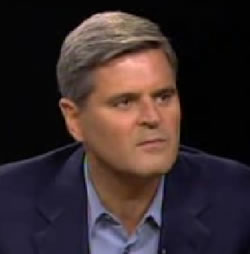 Steve Case, co-founder of AOL, now ex-chairman of AOL-Time Warner, has said he was sorry for the merger between AOL and Time Warner. It is widely regarded as a deal that didn’t go very well, leading to internal wrangling and huge amounts of money being knocked of share values.
Steve Case, co-founder of AOL, now ex-chairman of AOL-Time Warner, has said he was sorry for the merger between AOL and Time Warner. It is widely regarded as a deal that didn’t go very well, leading to internal wrangling and huge amounts of money being knocked of share values. When pushed, Case said from the point of shareholders of the two companies, employees & customers – it didn’t go as he’d hoped, it had been a disappointment and a source for frustration. Given the wide range of those included by Case, we don’t know who else might be disappointed who wasn’t included.
When pushed, Case said from the point of shareholders of the two companies, employees & customers – it didn’t go as he’d hoped, it had been a disappointment and a source for frustration. Given the wide range of those included by Case, we don’t know who else might be disappointed who wasn’t included.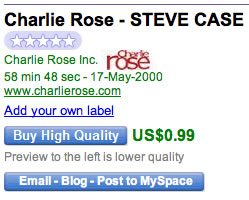 Google Video has been serving videos to the Internet population for over a year and a half now, both
Google Video has been serving videos to the Internet population for over a year and a half now, both 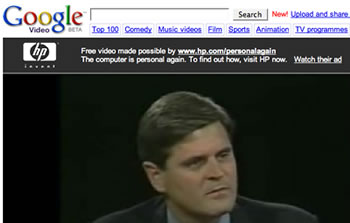 Clicking on Watch their Ad link opens a new browser session and plays the video advert from … Google Video. All very neat.
Clicking on Watch their Ad link opens a new browser session and plays the video advert from … Google Video. All very neat. The Murdoch empire continues to buy to part of the online world, as BSkyB announce the full purchase of Web publishing and design company, mykindaplace, a company that they’d invested in 2000 when they previously dabbled in buying bits of the Internet.
The Murdoch empire continues to buy to part of the online world, as BSkyB announce the full purchase of Web publishing and design company, mykindaplace, a company that they’d invested in 2000 when they previously dabbled in buying bits of the Internet.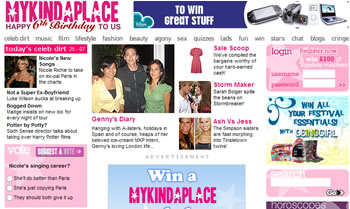 James Baker, Managing Director of Sky Networked Media, who will have the mykindaplace teams under his power, invented a new term to us “super-serve,” when he said “Working even more closely with mykindaplace will allow us to accelerate the expansion of our web portfolio. We intend to super-serve audiences in key content genres and target new users with a suite of content-rich sites thatdeepen customer relationships and drive new revenue.”
James Baker, Managing Director of Sky Networked Media, who will have the mykindaplace teams under his power, invented a new term to us “super-serve,” when he said “Working even more closely with mykindaplace will allow us to accelerate the expansion of our web portfolio. We intend to super-serve audiences in key content genres and target new users with a suite of content-rich sites thatdeepen customer relationships and drive new revenue.”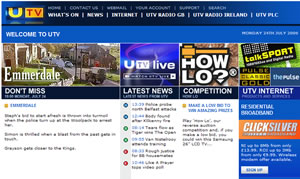 Following the surprise resignation of SMG’s Chief executive Andrew Flanagan, the pieces are in place for consolidation of the Scottish and Ulster media outfits that provide the Celts with their ITV services.
Following the surprise resignation of SMG’s Chief executive Andrew Flanagan, the pieces are in place for consolidation of the Scottish and Ulster media outfits that provide the Celts with their ITV services.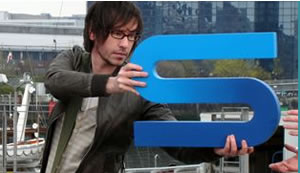 With many predicting the imminent departure of Charles Allen, ITV, a shareholder in SMG has troubles enough of it’s own to be ruled out of a takeover.
With many predicting the imminent departure of Charles Allen, ITV, a shareholder in SMG has troubles enough of it’s own to be ruled out of a takeover. Yahoo! and Motorola have cuddled up in their synergetic beds and fluffed up their co-branding pillows to announce a new deal that will see Yahoo! Go pre-installed on millions of Motorola handsets next year.
Yahoo! and Motorola have cuddled up in their synergetic beds and fluffed up their co-branding pillows to announce a new deal that will see Yahoo! Go pre-installed on millions of Motorola handsets next year.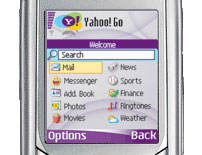 With two of the mobile phone big boys onboard, we reckon there’s been a fair amount of backside-kicking going on at arch-rivals Google, who must be well miffed to see Yahoo grab such a huge chunk of the market.
With two of the mobile phone big boys onboard, we reckon there’s been a fair amount of backside-kicking going on at arch-rivals Google, who must be well miffed to see Yahoo grab such a huge chunk of the market.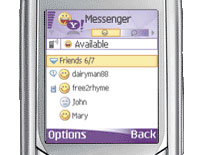 With more and more phones offering internet access, punters want to be able to easily access services, search the web and grab their mail on the move.
With more and more phones offering internet access, punters want to be able to easily access services, search the web and grab their mail on the move. There’s been tons of financial results coming out around now, but we’ve spared you from them – we’re nice like that. Today we felt it was worth an exception.
There’s been tons of financial results coming out around now, but we’ve spared you from them – we’re nice like that. Today we felt it was worth an exception.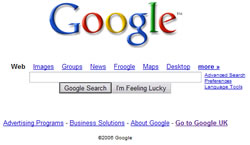 As is well known, one way Google does so well is by getting other sites (partners) to carry their clients advertising for them (of which Digital-lifestyles is one). In accounting-ese/jargon, they refer to it as Traffic Acquisition Costs or TAC. These increased to $785 million, up from $723 million in its first quarter. The TAC (see how quickly you can get into the swing of this jargon) remains at 32% of their advertising revenue, giving a rough understanding that Google take 68% of these ad earnings – pretty healthy in their favour.
As is well known, one way Google does so well is by getting other sites (partners) to carry their clients advertising for them (of which Digital-lifestyles is one). In accounting-ese/jargon, they refer to it as Traffic Acquisition Costs or TAC. These increased to $785 million, up from $723 million in its first quarter. The TAC (see how quickly you can get into the swing of this jargon) remains at 32% of their advertising revenue, giving a rough understanding that Google take 68% of these ad earnings – pretty healthy in their favour. YouTube is being sued by a video news service, Los Angeles News Service for infringing the copyright of their video material, in particular, the footage of the 1992 LA riots, including the horrific attack on a truck driver.
YouTube is being sued by a video news service, Los Angeles News Service for infringing the copyright of their video material, in particular, the footage of the 1992 LA riots, including the horrific attack on a truck driver.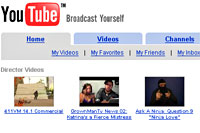 YouTube has made moves to reduce copyrighted material on their sites, including limiting the length of videos that can be uploaded.
YouTube has made moves to reduce copyrighted material on their sites, including limiting the length of videos that can be uploaded.